In 1982, TIME Magazine published a very special cover story: “The New Scarlet Letter.” In five dense pages full of salacious personal anecdotes and some incredibly horrifying doctoral testimonies, TIME set the standard for herpes journalism. I read the entire piece with my friend (and this site’s editor) Gabe Rosenberg so that you don’t have to. Because you shouldn’t. It’s really bad.
Special shoutout to my dad, who found an original copy of the publication on eBay for my birthday. The article is available online behind a paywall here. I’m including scans of sections of the article to provide context.
Ella: What’s your initial reaction to this bad boy?
Gabe: That whoever wrote and researched this piece (COUGH MAUREEN DOWD COUGH) has some great hatred for the “sexual revolution” and wanted to make it seem like herpes was God’s great reckoning for women’s sexual freedom. You see that in the language and the reporting both. Direct quote: “The herpes counterrevolution may be ushering a reluctant, grudging chastity back into fashion.”
Ella: It sets herpes up as weird karmic payback for the loosening of sexual roles.
Gabe: My favorite is when they call it “Jerry Fallwell’s revenge.” It sounds like the worst ever Six Flags ride.
 Ella: “Herpes counterrevolution” is the name of my new band. Referring to herpes as “The VD of the Ivy League” was fascinating to me too. There’s so much happening with class (and, quietly, race) in this piece, because no one is immune to herpes and it can’t be explained away by other factors. It reads like this oh fuck even we’re doomed reaction from privileged groups with access to great medical care. I love the infographic of “herpes victims”: 53% completed at least 4 years of college, 56% earn $20,000 a year or more. How is that relevant other than to say This even impacts us?
Ella: “Herpes counterrevolution” is the name of my new band. Referring to herpes as “The VD of the Ivy League” was fascinating to me too. There’s so much happening with class (and, quietly, race) in this piece, because no one is immune to herpes and it can’t be explained away by other factors. It reads like this oh fuck even we’re doomed reaction from privileged groups with access to great medical care. I love the infographic of “herpes victims”: 53% completed at least 4 years of college, 56% earn $20,000 a year or more. How is that relevant other than to say This even impacts us?
Gabe: It is explicitly stated that “black people have more important things to deal with than herpes,” which is condescending to EVERYONE. And of course, they want people to know that prostitutes all have herpes, because don’t ever forget that it is your fault that you contracted this disease.
Ella: “A trip to a prostitute is a high-stakes gamble.” Yup, because sex workers don’t, like, contract diseases FROM THEIR CLIENTS. For fuck sake.
Gabe: Herpes here is like the bogeyman. It’s something you warn your husband about so he doesn’t stray. It’s something that you get from one night stands, because how dare you, woman, think you can have casual sex without consequences.
Ella: Quite literally! “Wives now give husbands smiling lectures on the ravages of the disease to keep them faithful.” Like gurl, if that’s how you get your husband to stay with you, y’all are fucked.
 Gabe: I’m also interested in the shaming of oral sex. The fact that this came from Maureen Dowd, who literally won a Pulitzer Prize for slut-shaming Monica Lewinsky back in the ’90s, is more than appropriate. Not that Maureen Dowd has been a good journalist since then, or ever.
Gabe: I’m also interested in the shaming of oral sex. The fact that this came from Maureen Dowd, who literally won a Pulitzer Prize for slut-shaming Monica Lewinsky back in the ’90s, is more than appropriate. Not that Maureen Dowd has been a good journalist since then, or ever.
Ella: One of the central takeaways is that herpes destroys marriages, and if you get herpes when you’re single, you will never find a husband. How dare you find yourself attractive and worthy of love, ladies, with your “hard-to-see legions” way up in your cursed vag.
Gabe: It’s even doctor-sanctioned. The extent to which this article brings in doctors to scare the bejeezus out of sexually active people, and shame current herpes-havers, is amazing. “If there are any sores or discharge, it’s time to put your clothes back on and find another partner.” Don’t have a conversation, don’t get educated (because for all this article pretends to spend time on saying “it’s really not that scary if you know about it,” it spends way more time talking about how scary it is), just reject them outright. They’re not even worth the dignity.
Ella: The basic takeaway here is that having herpes is the worst because of stigma, and we’re going to tell you as many anecdotes as possible to reinforce that stigma. It’s written for a “clean” audience, and it sets up the assumption that herpes+ folks will not disclose because you will reject them, and you need to be ON THE ALERT for them. The section on how you can spot herpes+ people because their hands are chapped from washing them so much made me laugh so fucking hard.
Gabe: If, indeed, this article were attempting to dispel the myths around herpes in order to educate people—which it’s not—then everything about how it is organized and written is wrong wrong wrong. This article is the perfect example of how you should never write about a health issue. Ever. There are so many medical inaccuracies in here. What is surprising is how journalistically irresponsible it is.
Ella: There are lots of unsubstantiated but fascinating rumors that this was sponsored by Burroughs Wellcome Co. (the company that created Acyclovir) in order to create a market for herpes medication. I’m not a conspiracy theorist, but I think it’s fair to say that this article and its amazing cover were the best things to happen to herpes stigma ever.
Ella: Everything about this article is othering and extreme. It takes a fairly run of the mill skin disease and positions it as the worst possible thing to happen to society: it threatens marriage, it threatens family, it will threaten your job if you contract it, you shouldn’t trust anyone, etc. I would love to see the statistics to justify the line: “Herpes has emerged from relative obscurity and exploded into a full fledged epidemic.” And as someone herpes+, someone very at peace with her status, reading this was still like being punched in the stomach repeatedly by a WWE champion. I can only imagine how traumatizing reading this would be if you were newly diagnosed.
Gabe: It would be absolutely traumatizing to read this looking for answers about what herpes is—and how to live your life without feeling like everyone hates you—and be told there is no escape and nobody who lives with herpes is “normal” anymore.
Ella: In the summary in the index, it says, “Though the physical damage is often light, the psychological impact can be severe.” This article does nothing to explore where that stigma comes from, it just takes it as a given and builds it up even more. Stigma is created; it is a purely social thing. Obviously having sores isn’t fun and no one wants to get sick, but the concept that people with herpes are dishonest, lying, cheating monsters comes from people, not science.
Gabe: It doesn’t think about people who have dated, slept with, or married people with herpes. It doesn’t think about people with herpes who disclose happily with no problem.
Ella: It’s proof of how much storytelling matters. I’m not going to pretend that getting diagnosed wasn’t traumatizing, and I’m not going to deny that my first outbreak was painful. I do wash my hands a lot when I’m having an outbreak, and I have encountered herpes+ folks who don’t always disclose. But herpes is such a small part of my life, and I certainly don’t consider myself a “victim” or a “sufferer.”
Gabe: And you don’t self-segregate, like this article says is the only recourse for someone with herpes.
 Ella: I definitely don’t self-segregate, and MOST people don’t self-segregate. But there’s this theme in almost all herpes journalism that self-segregation is the first impulse and the only option when you get diagnosed with an STI, which just goes to show there aren’t enough herpes+ voices in the conversation. Whether that’s a self-imposed silence due to stigma and fear or journalistic irresponsibility is an interesting question. I’m guessing both. I wonder how they found the people they interviewed for this piece. Like, can we talk about the guy on page 65??! Stan?
Ella: I definitely don’t self-segregate, and MOST people don’t self-segregate. But there’s this theme in almost all herpes journalism that self-segregation is the first impulse and the only option when you get diagnosed with an STI, which just goes to show there aren’t enough herpes+ voices in the conversation. Whether that’s a self-imposed silence due to stigma and fear or journalistic irresponsibility is an interesting question. I’m guessing both. I wonder how they found the people they interviewed for this piece. Like, can we talk about the guy on page 65??! Stan?
Gabe: OH GOD THAT GUY. I took note of him immediately. My first thought was: Why is the first person in this article to actually bring up STIs before sleeping with a woman doing so as a DESPICABLE SELF-INTERESTED PICK UP ARTIST? My second thought was: “You don’t have herpes, do you?” is the ultimate encapsulation of all the problems with how this article approaches herpes.
Ella: YUP. That is literally the worst possible way to discuss sexual health with a new partner ever. It’s so accusatory, hostile, judgmental and stupid. Also, Stan is married. Why are we listening to anything Stan has to say?
Gabe: Can we also talk about the people trying to spread herpes on purpose, as revenge? And how they got more space than anyone working to prevent the stigma? Exact quote: “They were just one-night stands, so they deserved it anyway.”
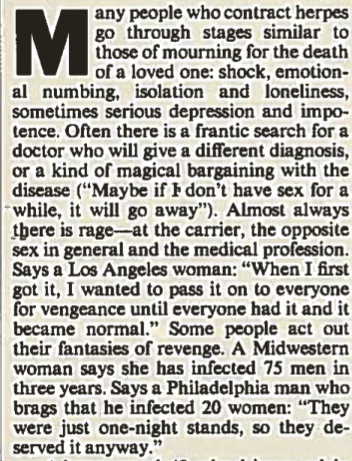 Ella: That was fucking horrifying. I’m like, incoherent with rage when I think about that section. Also, THAT ISN’T HOW HERPES WORKS. Seriously, the woman who said she’d infected 75 men in 3 years, or the man who bragged that he had infected 20 women? I want to dispel this gross rumor. If you have sex with someone while you have actual sores, yes, you are putting them at risk. 100%, no question you’re putting them at risk. And yes, there is something called asymptomatic viral shedding, when you can transmit the virus at times when you don’t have symptoms. But people with herpes aren’t always at risk of transmitting, and it isn’t as simple as “oh look, I touched you with my penis, now you have herpes.” Like, you cannot intentionally give hundreds of people herpes. You just can’t. And it’s seriously irresponsible as a journalist to present those anecdotes as fact. I don’t understand why they chose to include them other than to be sensationalist and scare the shit out of readers.
Ella: That was fucking horrifying. I’m like, incoherent with rage when I think about that section. Also, THAT ISN’T HOW HERPES WORKS. Seriously, the woman who said she’d infected 75 men in 3 years, or the man who bragged that he had infected 20 women? I want to dispel this gross rumor. If you have sex with someone while you have actual sores, yes, you are putting them at risk. 100%, no question you’re putting them at risk. And yes, there is something called asymptomatic viral shedding, when you can transmit the virus at times when you don’t have symptoms. But people with herpes aren’t always at risk of transmitting, and it isn’t as simple as “oh look, I touched you with my penis, now you have herpes.” Like, you cannot intentionally give hundreds of people herpes. You just can’t. And it’s seriously irresponsible as a journalist to present those anecdotes as fact. I don’t understand why they chose to include them other than to be sensationalist and scare the shit out of readers.
Gabe: They gave weight to this idea that simply because someone has herpes, there are no other options. You can never have sex, you can never touch, and you might as well just leave them. In fact, you should leave them, otherwise you’re a dope, because something must be morally wrong with them.
Ella: No one in this article who had herpes had any redeeming qualities or personality traits other than having herpes, too.
Gabe: Nobody has jobs or interests or friends or lives.
Ella: One lady worked for a company that wanted to fire her and make her use her own bathroom. And then there was the mom who covered her house in Lysol constantly because she was a control freak. I’m trying to remember if anyone was presented as a well-rounded human… It was just “my fiancé left me, my husband can’t get it up,” etc.
Gabe: This article doesn’t have any people in it. It just has a police line-up. The crime? Sexual freedom. The punishment? Life sentence. TIME was so obsessed with this idea of herpes being the new Scarlet Letter that it didn’t realize it was the one doing the branding.
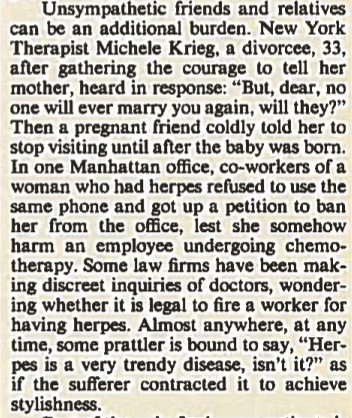 Ella: MIC DROP. Exactly. TIME Magazine is the one who put the gigantic red H on its cover. I think about this a lot now that publications are writing about me. You can write a glowing article about how awesome my stigma reduction work is, but if you lead with a stock photo of a woman’s mouth with a cold sore, guess what, you did more harm than good. Even if hundreds of thousands of people read this terrible, terrible article, millions saw that cover on newsstands.
Ella: MIC DROP. Exactly. TIME Magazine is the one who put the gigantic red H on its cover. I think about this a lot now that publications are writing about me. You can write a glowing article about how awesome my stigma reduction work is, but if you lead with a stock photo of a woman’s mouth with a cold sore, guess what, you did more harm than good. Even if hundreds of thousands of people read this terrible, terrible article, millions saw that cover on newsstands.
Gabe: It’s a core principle of journalism that, in reporting, you should try to “do no harm.” And it’s violated all the time, by Gawker, by TIME, by everyone. But the problem with stigmas is that these magazines don’t see the harm that they do is to the milieu, the atmosphere around which people exist, rather than directly to these people themselves. Herpes isn’t even the main stigma that journalism has added to over the years. But it’s one that’s still continuing to this day.
Ella: There was this amazing line in the letter from the publisher at the beginning of the issue: “The potential tragedy would be a continuing and pervasive public ignorance of what herpes is and how its estimated 20 million sufferers should react to it.” If it was your intention to prevent that tragedy, TIME, you failed.
Gabe: I also saw that editor’s note. I loved when they said, “Part of the herpes problem today is that discussion of the phenomenon sometimes seems almost as off-putting as the disease itself.” No shit, TIME.
Ella: They were basically like, these are problems, and we are going to gleefully make it worse.
Gabe: It’s the opposite of a public service. This was a public disservice.
Ella: Part of the reason I wanted to discuss this article with you was that you are an actual journalist, whereas I blog about my sex life and pretentiously refer to myself as a “storyteller.” You’re also herpes negative and can talk about this with slightly more objectivity than I can.
Gabe:: I’m also close friends with you, and objectivity is a lie. So that second part is dubious.
Ella: Either way, what do you think herpes journalism should be, if we use this as an example of what it shouldn’t be?
Gabe: I think we have to distinguish what sort of story we want to write. You already did a great job of covering the “personal narrative” side of talking about herpes, which is less journalism than essay.
 Ella: And we do need those personal narratives, they’re quite powerful when they come from people who actually have personal experience with herpes. But they’re becoming a trope.
Ella: And we do need those personal narratives, they’re quite powerful when they come from people who actually have personal experience with herpes. But they’re becoming a trope.
Gabe: What I’m concerned with is the reporters who want to quote-unquote “objectively” cover herpes as a trend/phenomenon/health issue/cultural issue, as an outsider. We’re lucky that the TIME piece exists, because that whole “WOAH HERPES IS CRAZY AND PEOPLE HAVE IT” angle is already done, dead, and, of course, wrong. The misunderstanding is already in the culture; it’s now journalists’ jobs to be the Mythbusters, to tell the stories that counter that narrative. And we need to do this by centering the people for whom herpes is a daily reality, and giving them a voice, more than simply a throwaway quote in a paragraph. If TIME is a revolving door of people coming to talk about how herpes sucks and is shameful, then good journalism is stopping that door and say, “Let’s talk about you.” And then repeat that multiple times. Get to know the diversity of herpes experience, from a diverse group of people. And do the research yourself, too. Get up-to-date on how to talk about herpes, what it means, what the different strains are, how one contracts it, what people do to simply live with it. Go forward with the assumption that herpes is simply one part of a multifaceted personality, and that there are other interesting and important and meaningful things about the people who have it.
Ella: And never refer to your subjects as “sufferers,” like, ever.
 Gabe: Framing is so, so important. As with any label, ask people what they call themselves. If there’s a term you think would be fitting for a group, ASK THEM if they’re okay with being called that.
Gabe: Framing is so, so important. As with any label, ask people what they call themselves. If there’s a term you think would be fitting for a group, ASK THEM if they’re okay with being called that.
Ella: Herpes is so weird because it doesn’t have a huge community associated with it. People with herpes never had to organize for any movement, it’s not like HIV/AIDS. The stigma thrives on isolation, so getting diagnosed makes us not want to talk about it, even though finding other people is what we need in order to heal. Herpes also impacts everyone—it cuts across gender, orientation, race, class, politics, nationality. Everything. So everyone has such different experiences, and there’s no real consensus on what the goal should be. I fight for stigma reduction, some people want to organize for a cure, others for a vaccine, others for testing, others for education. Most of us share some of those goals, but not all. So labels are tricky, terms are tricky.
Gabe: And here’s the great thing about herpes in journalism right now: You don’t need to cover it all. And so you shouldn’t. If people want to write pieces about herpes, they should go specific, not broad. You’re not going to break any new ground or do anything revolutionary by painting with broad strokes. Focus your piece on one activist, or one group, or one new scientific finding, or whatever, and humanize herpes as something that doesn’t simply brand a person and leave them to be only defined as “victim.” Herpes is not an identity.
Ella: Completely agree. There’s so much territory to cover that it’s impossible to do it all at once. I’d love to read about herpes transmission within families and how that changes the healing and acceptance process (I have friends who got oral herpes from parents because their mom or dad kissed them when they had a cold sore). It would also be great to get some real long form work about why doctors do and don’t test for herpes, and where we’re at in terms of a reliable, accessible test. I’ve heard chatter about it on the web but nothing concrete.
Gabe: Exactly. I’d love to read about issues of health care and herpes. Herpes is something that affects everyone equally, so thinking about class issues as a matter of making sure there’s effective treatment and prevention is also an area I’d love to see covered.
Ella: I would love to hear more from people of color about herpes. I’m so aware of my privilege as this bland little upper class white girl when I write. I represent the tiniest sliver of experience.
Gabe: I want to know about herpes in other countries, too. Let’s go beyond America.
Ella: This article was super USA-specific.
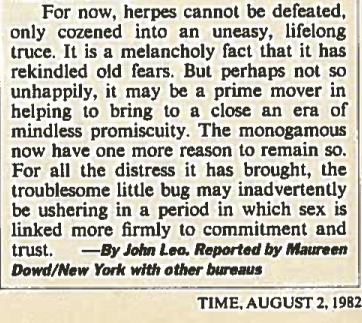 Gabe: Sure, because it was reacting against the USA-centric ’60s/’70s “sexual revolution.” I shudder to think what it would have done if it attempted to get a global picture.
Gabe: Sure, because it was reacting against the USA-centric ’60s/’70s “sexual revolution.” I shudder to think what it would have done if it attempted to get a global picture.
Ella: The sex-negative agenda they were pushing would have broken down.
Gabe: I want good reporters doing these stories, with good editors behind them. And, as with all things, I want journalists to learn from history and what’s been done.
Ella: Dear journalists: This is a topic that needs your work. Make it happen. Go for it.
Gabe: All these ideas are free for stealing, folks. Feel free to call us if you have any questions. I’ll probably just direct you to Ella, but STILL.
Ella: It’s funny, The Hairpin just ran a piece that was a series of interviews with people who have herpes. While it was nowhere near as horrifying as the TIME piece, it had some of the same problems. People were interviewed with no context as to who they were, they filled a lot of the same stereotypes, and there was no real presentation of facts. It was intended to reduce stigma and was quite honest about real experiences, but it didn’t do anything… new. It’s been over 30 years since the TIME article ran and we’re still not moving forward.
Gabe: It just perpetuates the problem in which people don’t want to be named, because they don’t want to be associated with herpes, which then perpetuates the idea that herpes is something to be ashamed of. We need to ask more questions than “When did you get herpes? How did you find out? Who gave it to you? How did you feel about it? Did your dating life suffer?”
 Ella: Those are the only questions journalists EVER ask me. I get so, so bored of it. Not to mention they’re all much more invasive questions than journalists realize. I got herpes from a traumatic, abusive relationship and I don’t want to get into that in a quick 12 minute interview. It’s too complicated and too painful. Talking about how someone gets herpes almost always plays into stereotypes. It does need to be talked about, but in the right way. I don’t know, I’m of a few different minds about it. Stories of how someone got herpes need to be done justice, if they’re being told. Often transmission or getting diagnosed is set up as the beginning of the story, and it really isn’t for everyone.
Ella: Those are the only questions journalists EVER ask me. I get so, so bored of it. Not to mention they’re all much more invasive questions than journalists realize. I got herpes from a traumatic, abusive relationship and I don’t want to get into that in a quick 12 minute interview. It’s too complicated and too painful. Talking about how someone gets herpes almost always plays into stereotypes. It does need to be talked about, but in the right way. I don’t know, I’m of a few different minds about it. Stories of how someone got herpes need to be done justice, if they’re being told. Often transmission or getting diagnosed is set up as the beginning of the story, and it really isn’t for everyone.
Gabe: That’s also why the “faces of people who have herpes” story should be locked away for a while. There are more interesting stories to tell with better questions to ask.
Ella: “Faces of people who have herpes”?
Gabe: Like, the “Here’s what it’s like to live with HERPES” piece like this TIME article and that Hairpin interview series. The fact of people having herpes is a big enough surprise that it is its own piece.
Ella: YES. If we keep labeling it as surprising, people will continue to think of it as surprising. It’s not surprising. Statistically it is not at all surprising.
Gabe: Herpes exists. Move on. Making a huge deal out of it is honestly not helpful or worth the space.
Ella: I remember when Women’s Health asked me to write about what it was like to date with genital herpes, I had no idea where to start. How do you consolidate two years of your life? But I did write an overview essay, focusing on specific moments. Since then I’ve tried to get very niche: how to disclose, what my individual relationships have been like, how I negotiate condom usage, etc. I want to go beyond “I have herpes hey isn’t that crazy?” It’s not crazy. At this point I’ve read quite a few essays about how people came to terms with stigma in their own lives and those are valid and great and necessary but they shouldn’t be the only stories we tell.
Gabe: Absolutely. If herpes is a health issue, we should be looking at it the same way we look at every other health issue. Which is often, and from many, many angles.
Ella: With journalism in addition to personal stories. With a look at the institutions involved, in harm reduction, in public health policy, in treatment, in education.
Gabe: Here’s my main thing: We’re here talking about the problems with herpes journalism. But the problem with herpes journalism is that it doesn’t exist. There is only herpes personal essays, and herpes confessionals. There is very little journalism on herpes being done today. Journalism in the sense of reported, researched, edited articles that look to seek truth and report it, identify sources, keep people accountable, support a civil exchange of views, avoid stereotyping, be accountable and transparent.
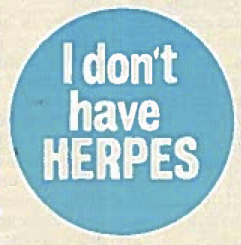 Ella: I wonder if journalists are afraid to write those stories because they worry that readers will assume they have some personal investment and think they have herpes… I can’t imagine no one has ever wanted to write these stories before. It might be that editors are afraid to run them, to risk the publication’s name on them?
Ella: I wonder if journalists are afraid to write those stories because they worry that readers will assume they have some personal investment and think they have herpes… I can’t imagine no one has ever wanted to write these stories before. It might be that editors are afraid to run them, to risk the publication’s name on them?
GR: I don’t think so. Journalists write about so much without really being concerned that people will think they are what they write about. Let’s check. I’m going to type in “herpes” into nytimes.com.
ED: Oh man, this’ll be fun.
Gabe: Some stuff about NYC laws against Orthodox oral-suction circumcision, which can lead to herpes in babies, a mention in an article on Ebola turning eyes different colors (herpes can do that too, i think?), somebody using it as a half-baked metaphor on libertarianism (sample: “We don’t have to pretend anymore that radical Islam is an existential threat to the West. It’s herpes, but it’s not AIDS. It’s a chronic condition, but it won’t kill us.”), something on new research into cold sores, and then a piece about how herpes as a virus goes back before our ancestors were even homo sapiens. So it’s not like the New York Times is being irresponsible with how it talks about herpes. It just almost never talks about herpes.
Ella: Well that’s lovely. And surprising, considering herpes has been around since the dawn of fucking time. Any last thoughts?
Gabe: If you’re trying to fight this stigma—which journalists should, because stigmas are a form of societal silence, and journalism is, of all things, the antithesis of silence—then be respectful, and be aware of what is hurtful and shameful and then do not do it. It’s become somewhat of my mantra by now, but I think it is eternally relevant and often forgotten: Empathetic journalism is good journalism. Otherwise, what are you doing it for?
Hey there! My name is Ella and I’m a sex and culture critic. If you enjoyed this essay, you’ll be right at home in my Patreon community!
Patrons get access to exclusive essays about intimacy, herpes, mental health and shame, monthly discussion threads, and other fun perks. My community makes it possible for me to write full-time and invest in my voice as a queer creator. Plus Patreon lets me get to know my readers — that’s you! — even better.


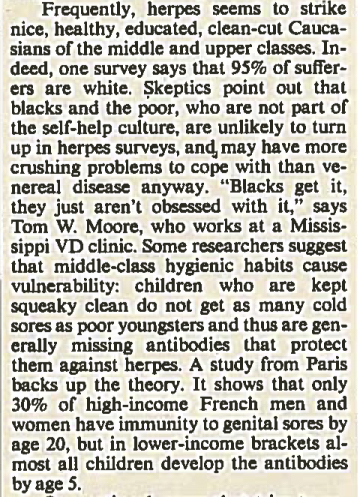

Stan also has no idea how to check a pulse (the thumb has a wider blood vessel which is why you use fingers so you don’t accidentally factor in the pulsing from your own thumb), and must be getting many false positive results considering his method involves suddenly shouting at a woman and grabbing her wrist.